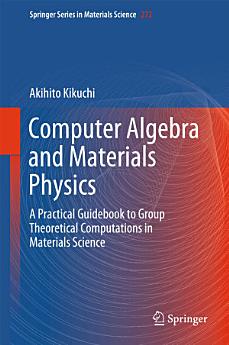Computer Algebra and Materials Physics: A Practical Guidebook to Group Theoretical Computations in Materials Science
Akihito Kikuchi
Jun 2018 · Springer Series in Materials Science Book 272 · Springer
Ebook
159
Pages
reportRatings and reviews aren’t verified Learn More
About this ebook
This book is intended as an introductory lecture in material physics, in which the modern computational group theory and the electronic structure calculation are in collaboration.
The first part explains how to use computer algebra for applications in solid-state simulation, based on the GAP computer algebra package. Computer algebra enables us to easily obtain various group theoretical properties, such as the representations, character tables, and subgroups. Furthermore it offers a new perspective on material design, which could be executed in a mathematically rigorous and systematic way.
The second part then analyzes the relation between the structural symmetry and the electronic structure in C60 (as an example of a system without periodicity). The principal object of the study was to illustrate the hierarchical change in the quantum-physical properties of the molecule, which correlates to the reduction in the symmetry (as it descends down in the ladder of subgroups).
The book also presents the computation of the vibrational modes of the C60 by means of the computer algebra. In order to serve the common interests of researchers, the details of the computations (the required initial data and the small programs developed for the purpose) are explained in as much detail as possible.
The first part explains how to use computer algebra for applications in solid-state simulation, based on the GAP computer algebra package. Computer algebra enables us to easily obtain various group theoretical properties, such as the representations, character tables, and subgroups. Furthermore it offers a new perspective on material design, which could be executed in a mathematically rigorous and systematic way.
The second part then analyzes the relation between the structural symmetry and the electronic structure in C60 (as an example of a system without periodicity). The principal object of the study was to illustrate the hierarchical change in the quantum-physical properties of the molecule, which correlates to the reduction in the symmetry (as it descends down in the ladder of subgroups).
The book also presents the computation of the vibrational modes of the C60 by means of the computer algebra. In order to serve the common interests of researchers, the details of the computations (the required initial data and the small programs developed for the purpose) are explained in as much detail as possible.
About the author
Akihito Kikuchi received his degrees of B. Sc, M.S. and Ph. D in physics in 1991, 1993, and 1996 from the University of Tokyo. Subsequently he worked as postdoctoral fellow and research associate at the institute for solid state physics in University of Tokyo. Today he works with a private company in Japan as a researcher. His research interests cover condensed matter physics, quantitative electronic structure theory, pseudopotential theory, molecular simulation, elementary excitation in solids, computational chemistry, and the application of symbolic computations (by means of group theory, algebraic geometry, and other modern theory of mathematics) in theororetical material science.
Rate this ebook
Tell us what you think.
Reading information
Smartphones and tablets
Install the Google Play Books app for Android and iPad/iPhone. It syncs automatically with your account and allows you to read online or offline wherever you are.
Laptops and computers
You can listen to audiobooks purchased on Google Play using your computer's web browser.
eReaders and other devices
To read on e-ink devices like Kobo eReaders, you'll need to download a file and transfer it to your device. Follow the detailed Help Center instructions to transfer the files to supported eReaders.







